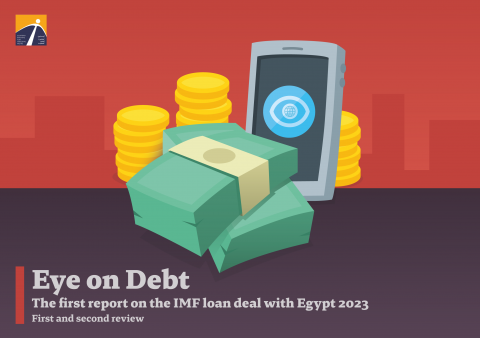Eye on Debt: The first report on the IMF loan program with Egypt 2023 First and second review
This report was prepared by Mohamed Ramadan, researcher at the Economic and Social Justice Unit of the Egyptian Initiative for Personal Rights (EIPR), and edited by Wael Gamal, director of the unit.
I. Introduction
This report provides an analysis of the implementation of the policy program included in the International Monetary Fund (IMF) loan deal that was signed with the Egyptian government in January 2023. EIPR presents this independent review of the deal aiming to provide an alternative reading of the IMF program, linking it to the actual economic and social impacts observed throughout the implementation period, especially in light of the grinding cost-of-living crisis in Egypt caused by high inflation rates resulting from the devaluation of the local currency. Since the program came into effect, more than a year and a half ago, the Egyptian economy has not been able to overcome instability, financial storms and increasing debt. While GDP growth has declined at a very high cost due to the austerity measures and successive hikes in the prices of public services, which is expected to raise the number of Egyptians sliding under the poverty threshold by millions.
The report reviews what IMF conditions Egypt has implemented in 20 months, as well as the conditions that Egypt avoided implementing, causing delays in the IMF reviews and in the receipt of loan instalments consequently. The report assesses the economic and social impact in both cases. The report studies two main documents, namely the loan document itself and the two combined IMF reviews that were revealed late April.
The IMF had amended the program in March 2024 to increase the loan from $3 billion to $8 billion, and provided the opportunity for Egypt to borrow additional $1 billion to $1.2 billion through the IMF’s new Resilience and Sustainability Facility (RSF).
- Despite the Fund's announcement on 6 June that a staff-level agreement was reached on the third review, Egypt had to wait for an additional month – July 2024 – before the IMF board approved the results of its third review of the agreement, then received a new instalment of the loan worth $820 million. The board postponed its approval until the Egyptian government announced a new cycle of fuel and electricity price hikes, which the government had originally planned to postpone to September. Details of the third review have not been made public until the time of writing this report.
Click here to read the full report




